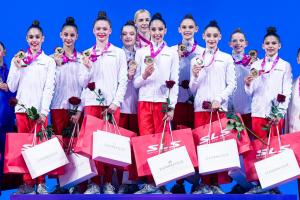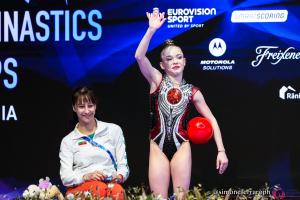This website uses cookies. By continuing to use our site you are agreeing to our use of cookies.
For more details about cookies and how to manage them see our privacy policy.
Preview of the Rhythmic Gymnastics season
Some of the world’s best gymnasts debuted their competition routines last weekend at the Moscow Grand Prix, giving us a glimpse of what to expect this season.
Russian twins Dina and Arina Averina have dominated the 2017 & 2018 seasons and are looking to continue their winning streak in the lead-up to the Tokyo Olympics next summer.
Teammate Aleksandra Soldatova, who won the World title with ribbon last year, will be there to push the twins on and fight for the medals herself. We’re looking for to see the other European stars fighting for their place in the spotlight as well.
First, we have the European Championships in Baku (AZE) where the junior groups and senior individuals will compete. Many gymnasts know the venue well, from both the 2015 European Games and the annual World Cup event. The format has changed a bit to avoid competition days that are too long and tiring for the gymnasts. These Europeans will be held over four days, instead of three.
Belarussians Katsiaryna Halkina, Anastasia Salos and Alina Harnasko will have the support of the home crowd at the second edition of the European Games as it will be held in their capital city Minsk. More big names to watch this season include Linoy Ashram (ISR), Bulgarians Katrin Taseva and Neviana Vladinova, Ukraine’s Vlada Nikolchenko who aims to take Ukraine back to the top, Italians Alexandra Agiurgiuculese and Milena Baldassarri, Kseniya Moustafaeva (FRA), Salome Pazhava (GEO) and many others. Juniors will have the opportunity to participate in the first ever junior World Championships which will be organised in July in Moscow (RUS).
The open-ended difficulty in group exercises has made the compositions even more spectacular. Fast-moving and original, the gymnasts know how to captivate the audience. In doubt, just look at the wonderful routines produced by Bulgaria, Italy, Russia, Azerbaijan, Ukraine, Belarus etc.
The 2019 Rhythmic season concludes in September at the all-important World Championships, also held in Baku (AZE). There, the 16 highest ranked individual athletes from the all-around final results -with a maximum of 2 gymnasts per country- will qualify a quote place for their country. Three groups -Bulgaria, Italy and Russia- already secured their Olympic participation last year. This year, the five highest ranked groups from the general competitions not already qualified will qualify one group quota place. The remaining Olympic entry tickets will be decided based on the results on the 2020 World Cup series and the 2020 continental championships. For more info on the Olympic qualifying procedure, check out the FIG website: http://www.gymnastics.sport/site/rules/rules.php
Calendar 2019
|
1 – 3 March |
Grand Prix – Marbella (ESP) |
|
16 – 17 March |
Grand Prix – Kiev (UKR) |
|
30 – 31 March |
Grand Prix – Thiais (FRA) |
|
5 – 7 April |
World Cup – Pesaro (ITA) |
|
12 – 14 April |
World Cup – Sofia (BUL) |
|
19 – 21 April |
World Cup – Tashkent (UZB) |
|
26 – 28 April |
World Cup – Baku (AZE) |
|
3 – 5 May |
World Challenge Cup – Guadalajara (ESP) |
|
16 – 19 May |
European Championships in Rhythmic Gymnastics – Baku (AZE) |
|
21 – 30 June |
European Games – Minsk (BLR) |
|
30 June – 6 July |
RG Training camp – Obertraun (AUT) |
|
19 – 21 July |
Junior World Championships – Moscow (RUS) |
|
16 – 18 August |
World Challenge Cup – Minsk (BLR) |
|
23 – 25 August |
World Challenge Cup – Cluj-Napoca (ROU) |
|
30 August – 1 September |
World Challenge Cup – Kazan (RUS) |
|
6 – 8 September |
World Challenge Cup – Portimao (POR) |
|
16 – 22 September |
World Championships – Baku (AZE) |


